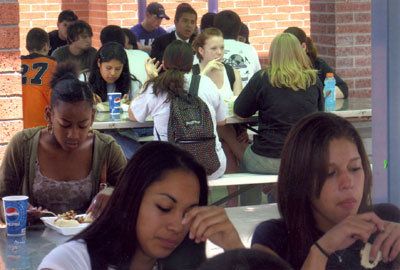All Nonfiction
- Bullying
- Books
- Academic
- Author Interviews
- Celebrity interviews
- College Articles
- College Essays
- Educator of the Year
- Heroes
- Interviews
- Memoir
- Personal Experience
- Sports
- Travel & Culture
All Opinions
- Bullying
- Current Events / Politics
- Discrimination
- Drugs / Alcohol / Smoking
- Entertainment / Celebrities
- Environment
- Love / Relationships
- Movies / Music / TV
- Pop Culture / Trends
- School / College
- Social Issues / Civics
- Spirituality / Religion
- Sports / Hobbies
All Hot Topics
- Bullying
- Community Service
- Environment
- Health
- Letters to the Editor
- Pride & Prejudice
- What Matters
- Back
Summer Guide
- Program Links
- Program Reviews
- Back
College Guide
- College Links
- College Reviews
- College Essays
- College Articles
- Back
Hidden Behind a Screen
Cyber-bullying. A step up from the traditional schoolyard bully. Instead of using an annoying voice or a fist to bully someone, they are using the Internet. This is a problem that can lead to self-esteem issues, depression, anxiety, and in some cases, suicide.
While most of teens and adolescents are getting cyber-bullied, only 1 in 10 of them tell someone. Teens all over are getting cyber-bullied and no one is there to help them.Over half of teens and adolescents have been cyber-bullied, and about the same number have been the cyber bully themselves. Being isolated like that can hurt that person even more. It can lead to depression and anxiety. Since the bullying is done online, anyone can see it. When posts about someone are seen by more than a couple people, that person may not want to go outside or face the people who have seen it. Their self-esteem drops and they do not want to face the outside world. As their self-esteem drops, they can develop eating disorders and depression.
In 2006, there was a girl named Megan Meier, age 13. She created a MySpace account and soon after, she received an online message from a 16-year-old named Josh Evans. They soon became friends from online. Megan learned that he recently moved to her area, was home schooled, and did not yet have a cell phone. On Monday, October 16, 2006, the messages started to change. Josh had sent her, “I don’t know if I want to be friends with you anymore because I’ve heard you are not very nice to your friends.” More messages like this were sent, and some of Megan’s messages were posted online. The last message ever sent by Josh was, “Everybody in O’Fallon knows who you are. You are a bad person, and everybody hates you. Have a s****y rest of your life. The world would be a better place without you.” Megan was found later in her closet. She had hanged herself with a belt.
A parent or trusted adult should be the one place a person can go if they are being cyber-bullied. A problem with that is most parents will underreact, telling their kids the saying, “Sticks and stones may break your bones, but words will never hurt you.” That statement could not be further from the truth. When one person says something online, it circulates throughout the Internet and everyone sees it. With millions of people all over the world reminding you of it, you can get severe emotional wounds. Though some parents underreact, a lot of them will try to help you. They will talk to authorities, talk to the cyber-bully’s parents, and help you feel safe. A teacher should be another person you can go to, but some teachers or school authorities are not very helpful. They might say it’s out of their hands, or if they can not see it, it’s not there. Other teachers will try to help you in anyway they can, talk with the cyber-bully, and try to make you feel safe.
With all of the technology today, and over 80 percent of teens use their cellphone regularly, says Bullyingstatistics.org, trying to stop cyberbullying is very difficult. One important thing that would help is you. If you see someone getting cyber-bullied or you are being cyber-bullied, tell someone. A trusted adult, a friend, a family member, even someone in law enforcement. If you get cyber-bullied, do not forward or respond to the message. Block the person or report them. Take deep breaths, take a bath, play sports, play video games, talk to someone, anything that makes you feel better. Make people aware that you, or someone you know, are being cyber bullied. Have school assemblies to let everyone know about the effects of cyber-bullying, get your voice out. Start a program at your school to stop cyber-bullying. Have the students sign their names or handprints on a big paper stating they pledge against cyber bullying.
Cyber-bullying is a problem that can be stopped. It hurts people and can kill them too. Tell someone when it happens. Get help to stop it from happening again. Remain calm whenever it happens. It starts with you, do the right thing. Do not cyberbully and try to stop it.

Similar Articles
JOIN THE DISCUSSION
This article has 0 comments.
